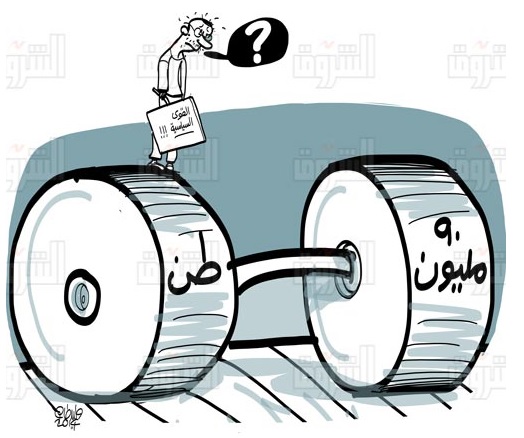Catch up on the latest out of Egypt every week, with analysis, news updates, photos, videos, and more.
Quote of the Week
“Most importantly, Ansar Bayt al-Maqdis could become a launching pad for jihadists from all over the world who are not able to join IS, given the difficulty of reaching Syria and Iraq.” – Moustafa Bassiouni expressed his concerns after Ansar Bayt al-Maqdis pledged alliance with the Islamic State. [Al-Monitor]
Egypt in the News
- Five al-Azhar students sent to military court; HRW condemns expansion of military trials
- Ansar Bayt al-Maqdis claims responsibility for deadly attack on soldiers
- Egypt’s unemployment remains high at 13.1 percent in third quarter
- Government ready for tough response to Salafi Front ‘Islamic Uprising’
- Three parties withdraw from Mubarak-era electoral alliance; Nour Party fails to form alliances
- Actor accused of treason for criticizing Sisi’s security record
- Police disperse minor protests commemorating Mohamed Mahmoud clashes
- Egypt welcomes Saudi monarch’s appeal to support gulf accord
- Egyptian NGOs call for ‘serious’ government talks
- Sisi says pardon for Al Jazeera journalists “being discussed”
- Doctor and father acquitted in Egypt’s first FGM trial
- Egyptian police arrest Brotherhood ‘moderate’ Mohamed Ali Bishr
- Egypt’s Sisi calls on West to support Libya to avoid new Syria, Iraq
- Militant group Ajnad Misr claims Helwan University blast
- Eleven Brotherhood members sent to Egypt’s military prosecution
In-depth
“The Future of Big Business in the New Egypt” | Amr Adly, Carnegie Endowment for International Peace
“Big business controls industries that are key to any recovery. The military may replace big businesses in the immediate term, but longer-term stabilization depends on the resumption of activities by large private enterprises. Big business still controls important sectors of the economy—including manufacturing, tourism, telecommunications, commerce, and housing—that are essential to any revival in investment or employment.”
“Foreign capital will return to the private sector. Private foreign investors will ultimately prefer working not through the military but through big business, as they have in the past.”
“Interactions between business and the state may be changed. The military’s entry into new sectors could lead to a redrawing of the lines of interaction between the military and big business, especially in areas such as construction and access to land. Faced with higher tax bills and reduced subsidies, business may also be forced to depend less on government.”
“The Egypt-Gaza Buffer Zone: More Harm than Good for Sinai Security” | Zack Gold, The Institute for National Security Studies
“A buffer zone is likely to further damage the smuggling industry: any tunnel will have to be at least 1000 meters longer, and once discovered and destroyed would take more time to restore. However, what Egypt gains in further halting militant infiltration from Gaza would be wasted if the policy feeds the insurgency in Sinai itself. According to a press release from the Egyptian embassy in Washington, Sisi “stressed the need to provide the residents of this area time to evacuate and relocate,” although witnesses on the ground have described the expediency with which they were displaced.”
“Sinai’s population is already marginalized from Egyptian society, and by driving residents from their land the Egyptian military risks driving them into the waiting arms of Ansar Bayt al-Maqdis and other violent anti-state groups.”
“For Gaza’s population, the buffer zone may signal further isolation, but the trade in smuggled consumer goods has already been halted to the point that this latest effort should have limited impact on the Strip’s already dire humanitarian situation. Israeli policymakers, therefore, need not worry about serious backlash from the Palestinian enclave, and indeed for almost a decade successive Israeli governments have encouraged more Egyptian activity on the Gaza border. However, Israel should be concerned that Egypt’s move could prolong instability in Sinai, which continues to bleed across the border.”
On Twitter: Doctor Acquitted in Egypt’s First FGM Trial
An Egyptian court on Thursday acquitted a father and a doctor over performing a female circumcision operation that killed a teenage girl, Sohair al-Batea, in the Nile Delta city of Mansoura last year.
91% of women aged 15-49 are cut in #Egypt despite a ban on #FGM since 2008. Yet 1st doctor to face trial is acquitted http://t.co/yGppMUKnXl
— Bel Trew – بل ترو (@Beltrew) November 21, 2014
Here is the #FGM acquittal verdict, written down in a ledger. It wasn’t even announced in court. pic.twitter.com/bqQQeiZnzl
— Patrick Kingsley (@PatrickKingsley) November 20, 2014
The UN in Egypt is deeply concerned by recent developments in the case of Soheir El-Batei, a victim of #FGMhttp://t.co/37Y1pQdMpy
— United Nations Egypt (@UNEgypt) November 21, 2014
9 in 10 Egyptian women are circumcised. A traveling play encourages women to talk about it. http://t.co/6lr7i8M9Cvpic.twitter.com/L7Is043YdA
— DW (English) (@dw_english) November 21, 2014
After acquittal of doctor in Egypt’s FGM trial, worth re-visiting this story from 2007 to see how little has changed: http://t.co/SaDnQYxuMx
— Louisa Loveluck (@leloveluck) November 21, 2014
Background on the #Egypt doctor acquitted of performing FGM today: http://t.co/KJT3ts7Ybp Important @TimepDC piece.
— Eric Trager (@EricTrager18) November 20, 2014
As social issue, #FGM to only be overcome on multi-faceted basis, education, outspoken parents, legislation, state will to prosecute #egypt
— Mai El-Sadany (@maitelsadany) November 20, 2014
Video of the Week: Sisi Considering Pardon for Al Jazeera Journalists
Cartoon of the Week

Source: Shorouk
On the man’s board: The power of politics
On the barbell: Ninety million tonnes
![The Week in Egypt [November 24, 2014]](https://www.atlanticcouncil.org/wp-content/uploads/2014/11/20141124comic.jpg)